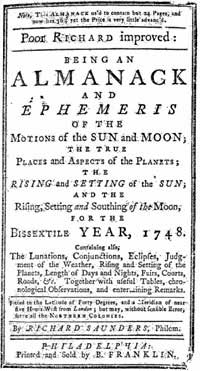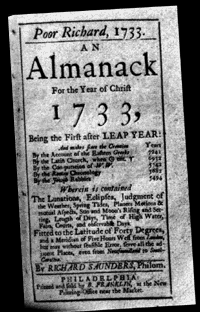

Temple's Diary
A Tale of Benjamin Franklin's Family
In the Days Leading up to The American Revolution
Uncle Richard is elated today, not even fussing at his wife because the baby never leaves her arms. No, he caresses Hannah's blond head and whispers that she will soon be as well as every other little girl.
— "Temple," he says, "listen to my news. Today, this very day, I am to be certified as secretary and comptroller of the Post Office at a salary of 340 dollars a year. Three hundred and forty dollars, my boy! This has been in the works for some time but we did not want to tell you until we were sure."
— "What's a comptroller?"
— "The man who checks the accounts. I'm good at that, having been in business for so long."
— "Congratulations, Uncle Richard! Is this happening because of the postmastership that Grandfather assumed last July?"
— "Yes, but let me tell you that the colonies had begun running their own postal system well before your grandfather was dismissed by mother-England. As early as 1773, some enterprising postriders in New England started establishing routes of their own in defiance of the law. The colonists wanted to communicate among themselves without fear of their letters being intercepted and read by the King's officials. Pretty soon, independent post offices were making their appearance all over New England ..."
— "How could they get away with that?"
— "The official supervisors felt powerless to stop them. A postmaster who tried to interfere with this practice would surely have been branded the friend of oppression, an enemy of America, and might have found himself in serious danger."
Aunt Sally interrupted: "And now my poor Papa who had spent so much time and energy in reorganizing the earlier postal system back in the 1750s has to start all over again in a different way."
— "I know how much he likes to rearrange things. But don't tell me, Aunt Sally, that England had no experience in running a postal system. They've been at it for centuries."
— "No need to bristle. Papa only reformed the part that was not working here. He soon found out that the system was not paying for itself because a number of postriders were privately delivering the letters and keeping the payments. So he printed up detailed rules and regulations, and anybody connected with the postal service had to take an oath of obedience to them.
"Also, the postmaster had to keep very detailed accounts since it was the person who received the letter who had to pay. There was not much small change in those days, so people did not pay right away — they sometimes ran up debts that went on for a very long time. All those transactions were recorded in seven ledgers that I have right here at home, in a drawer..."
— "The drawer in which she keeps her petticoats" interposed Uncle Richard, always one for precision.
Aunt Sally further informed me that once Grandfather's reforms had been put in place, the postal system finally started paying for itself, meaning that the postmasters were able at last to earn some income. Grandfather appointed his brother John to take charge of the Boston office; his brother Peter was also provided with a well-paying occupation. My own father, she said, became involved in postal business when Grandfather was called on to travel far and wide to design and establish new routes. Even grandmother Deborah was called upon to serve as postmistress during her husband's absences!
— "A Franklin family affair" I muttered. "Isn't that what is called nepotism, from the Latin nepos, nephew?" (I like to show off my Latin on occasion).
— "Nothing wrong with that" exclaimed Sally. "Especially now that my dear Richard is about to become such a good comptroller. And one day you might too, Billy."
I understand what they are doing. They are trying to introduce me to every facet of the family, past and present, to make up for those fifteen years of my non-being, to make me feel that I belong. It is very kind of them but the topic of the post office and its endless accounting bores me to death. I'm trying not to yawn. And suddenly Uncle Richard's voice, a little louder: "What you have not grasped, Temple, is that it is not just money we are talking about, but power."
— "Power?"

Poor Richard's Almanack
— "Yes, the power to decide what kind of mail goes free. Many years ago, when your grandfather was launching his Pennsylvania Gazette and his Poor Richard's Almanack, he had a rival in the person of one Andrew Bradford who published The American Weekly Mercury.
Well, this Bradford who was then postmaster of Philadelphia forbade the postriders to carry the Gazette. Your grandfather had to bribe them secretly to get them to do so. Eventually he appealed to his superior in England and won his case."
It is hard to imagine Grandfather so venerated around here having had to battle that way to establish his turf. And yet I have been told so many stories about his difficult beginnings: no more than three pennies in his pocket when he first landed in Philadelphia, no money at all when, at 18, he arrived in London after the governor of Pennsylvania had promised him so much and delivered nothing, no money for his return trip until he had earned it over many months, no money to start his own printing press for a number of years, not enough money to impress the parents of eligible girls, those who come with a dowry, and yet...
I got out of my daydreaming just in time to hear Uncle Richard and his wife marvel at Grandfather's generosity. Offered a salary of one thousand pounds a year for his new postal employment, he declared that all of it would go to help disabled veterans and their families. Money, power, prestige, all of that goes with the post office, as I can see now, but I still don't want any part of it. All those columns of figures, all those dull ledgers that Sally has picked out of her petticoats ... I don't want to have anything to do with them.

Poor Richard's Almanack
— "Does the postal system have any relation to history?" I ask. "I promised Grandfather that I'd keep an account of the historic events of our time. I mean History with a capital H."
— "Yes, Billy," said Uncle Richard, "you are living History this very minute. The most historic thing taking place is the making of a new country from the ground up. And communication is one of the big pillars of a country's foundations.
— "What do you mean by foundations?"
— "The underlying systems and institutions necessary for a country to sustain an independent existence."
— "What about the other pillars?"
— "An army. It is beginning to take shape under General Washington. That is why your grandfather is about to set off to confer with him in his camp on the Cambridge Common in Massachusetts. Another crucial pillar is a tax system but we are still far away from that. Our own currency should make its appearance soon. And don't forget the navy, we desperately need a navy to fight off the blockade."
— "Are we to have a navy pretty soon?"
Suddenly we look at each other, Richard and I, with what I would call a wink, a wink of complicity and surrender. We both said "we" when discussing this new country, we both, born and bred in England, have unconsciously identified with the other side.
Will someone tell me where I stand? History, will you tell me?
